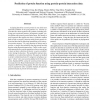Free Online Productivity Tools
i2Speak
i2Symbol
i2OCR
iTex2Img
iWeb2Print
iWeb2Shot
i2Type
iPdf2Split
iPdf2Merge
i2Bopomofo
i2Arabic
i2Style
i2Image
i2PDF
iLatex2Rtf
Sci2ools
129
click to vote
CSB
2002
IEEE
2002
IEEE
Prediction of Protein Function Using Protein-Protein Interaction Data
Assigning functions to novel proteins is one of the most important problems in the post-genomic era. Several approaches have been applied to this problem, including analyzing gene expression patterns, phylogenetic profiles, protein fusions and protein-protein interactions. We develop a novel approach that applies the theory of Markov random fields to infer a protein’s functions using protein-protein interaction data and the functional annotations of its interaction protein partners. For each function of interest and a protein, we predict the probability that the protein has that function using Bayesian approaches. Unlike in other available approaches for protein annotation where a protein has or does not have a function of interest, we give a probability for having the function. This probability indicates how confident we are about the prediction. We apply our method to predict cellular functions (43 categories including a category “others”) for yeast proteins defined in the...
Bioinformatics | CSB 2002 | Protein | Protein-protein Interaction | Protein-protein Interaction Data |
Related Content
| Added | 14 Jul 2010 |
| Updated | 14 Jul 2010 |
| Type | Conference |
| Year | 2002 |
| Where | CSB |
| Authors | Minghua Deng, Kui Zhang, Shipra Mehta, Ting Chen, Fengzhu Sun |
Comments (0)

